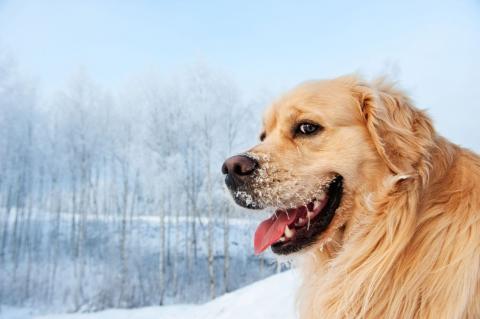
Cold weather and icy conditions can be hard on pets. Learn how to make sure your pet is safe and comfortable in the harshest winter weather conditions.
Keep Warm Against Hypothermia & Frost Bite
Imagine if you went outside in the snow or in below-freezing temperatures without your shoes, hat, and gloves on. For pets, the exposure is the same for their paw pads, noses, and ears. Frostbite and hypothermia are sadly very common during extreme cold. To protect your pet:
- Rub petroleum jelly on your pet’s paw pads to protect against irritating de-icing agents.
- Keep Walks Short.
- Bundle your pet in a sweater and booties (and possibly a hat) before walks to help conserve body heat and to protect against de-icing chemicals.
- Bring a towel along on the walk to wipe away ice balls and any salt or de-icing chemicals that get stuck between his toes.
- After a walk, make sure to wipe your pet’s paws and tummy with a damp towel as rock salt and de-icing chemicals can irritate your pet’s feet.
Feed Pets a Winter Diet
During winter, pets that live outdoors burn more energy when outside, while pets that live indoors conserve more energy inside by sleeping more. Adjust your pet’s diet accordingly.
Feed outdoor pets more food, so they can stay charged.
Keep outdoor pets’ water dishes fresh and flowing. Also, only feed your outdoor pet in plastic containers as their tongues can stick to metal serving dishes.
Adjust indoor pets’ foods according to their activity levels to keep them from getting overweight and lethargic in the winter.
Recognize Signs of Hypothermia & Frostbite
If you notice your pet is doing any of the following things that indicate hypothermia, contact your vet or emergency pet care specialist immediately:
- Slows down or stops moving
- Shivers, whines, or appears anxious
- Seems to be weak
- Seeks a place to burrow for warmth
- Signs of frostbite may not show up until the damage is done. Signs of frostbite include:
- Swelling where frostbite occurred
- Skin discoloration (pale, gray, bluish or blacked / dead skin) where the frostbite occurred
- Blisters or skin ulcers
- Coldness or brittleness on affected areas
As with hypothermia, seek medical help immediately. Snow and cold weather can adversely affect your pet’s health, so take appropriate steps to keep them safe when it freezes and snows. Keep them warm when going out for walks, create warm shelters, adjust their diets accordingly, and recognize the signs of danger due to elemental exposure. By doing this, you and your pet will have a safe and happy winter.
One of the ways you can keep your pets safe in snow is by feeding them a diet rich in healthy nutrients so they can maintain a healthy weight and energy level. Holistic Select Natural Pet Food is made with natural ingredients and are full of essential vitamins and nutrients for your pets’ winter diet.